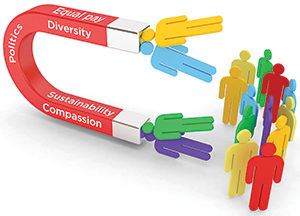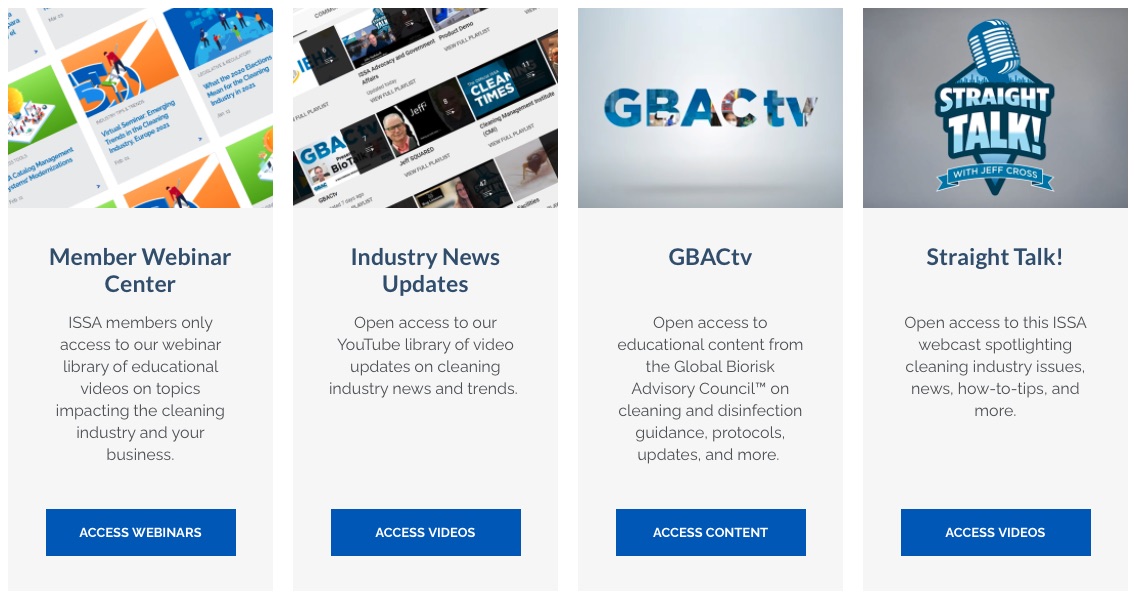Articles
Caring is Cool
Categories: Business Management
By Sam Sanetra | August 24, 2018 << Back to Articles
Americans care about the ethical actions of organizations. In fact, 56 percent of Americans stop buying from brands they believe to be unethical; more than one third (35 percent) of consumers stop buying brands they perceive as unethical despite no available substitute, and 27 percent stop purchasing even if they think the competitor offers lower quality, according to The Ethical Consumer—U.S. report, published by market intelligence agency Mintel. This ethical buying pattern is even more pronounced within younger generations, and it is not confined to America.
“Millennials prefer to do business with corporations and brands with pro-social messages, sustainable manufacturing methods, and ethical business standards,” declares Forbes.com in its 2017 summary of the annual Neilson Global Corporate Sustainability Report. The research found that 66 percent of all surveyed consumers are willing to spend more for a product if it comes from a sustainable brand. This rose to 73 percent among the surveyed younger generations while a whopping 81 percent said they expect their favorite companies to make public declarations of their corporate citizenship. These same sentiments apply to where they work. Younger generations care about the challenges facing the world today. They are concerned about the environment, social justice, diversity, religious freedom, politics, and equal pay for equal work. The ethical treatment of minorities, the LGTBQ+ community, women, and animals also matter to this age group.
America and many other developed nations are becoming increasingly progressive, and savvier companies are building a culture to keep up with these changing times. Meanwhile, a business viewed as being indifferent towards these social issues will struggle to connect with the workers—and buyers—of the future and risks losing its competitive edge. Bottom line: Young job seekers and purchasers want to see companies that care. But it must be sincere.
With greater access to education and science than previous generations, most young people today are far better equipped to spot insincerity in an organization. They Google, they “like,” and they “follow” their favorite companies, and if a company’s message of social concern is all talk and no action—or worse seen as a wrong action—they will move swiftly away from the business. This said, below are just a few areas where showing your company’s heart can earn kudos, job candidates, and increased profits.
Environmental
Nearly all young professionals want to support companies willing to take steps to protect and help the environment. They understand the importance of combating climate change; they care about preserving the planet for future generations.
For example, when Dawn dishwashing liquid came to the rescue by providing a safe way to clean up and save the ducks and other wildlife harmed by the British Petroleum oil spill, the company was overwhelmed with positive public support. This action basically cemented Dawn as the grease fighting detergent of choice for up coming generations. This type of sincere, good-Samaritan action creates a feeling of goodwill among young professionals that can directly translate into profits—and a loyal, young workforce.
Diversity
A company that hires a diversified workforce shows potential employees that a larger demographic of people can feel comfortable pursuing a job within the business. Hiring a broad range of races, ethnicities, and social backgrounds shows that the company is concerned with hiring the best people and isn’t distracted by prejudices. Furthermore, diverse companies have a better opportunity to find quality employees as they are interested solely in workers’ abilities and the pool of potential candidates is larger.
Compassion
One case of a company showing compassion is ComEd. When Hurricane Maria struck Puerto Rico in 2017, ComEd rushed in to assist, sending personnel and equipment to help restore damaged areas left without power. This move demonstrated to the world that ComEd is a company that cares about the world. There was overwhelming public support for this action, and as a result, ComEd reaped substantial PR benefits with old—and young—alike.
In a slightly different example, the cosmetics giant Lush recently started a video campaign for its products called “How It’s Made.” The series transparently shows customers how Lush products are made—which means disclosing ingredients, a trend increasingly popular with young professionals. And each video is hosted by a real employee. This shows that the company not only values the opinion of its employees, but also trusts them to be ambassadors for the company, thereby humanizing the brand and its appeal.
Politics
A recent Morning Consult poll (February 2018) found that “Companies looking to boost demand among consumers may want to consider being more vocal with politics.” This idea has repeatedly been proven correct, especially with younger generations.
For example, in early 2018, Netflix actively withdrew support for the Federal Communications Commission (FCC) following its repeal of net neutrality. Netflix took to social media platforms to publicly state its disapproval of the FCC’s decision. This greatly appealed to young progressive professionals. The younger generations believe in a free and open internet, and thus the support Netflix received from this demographic was overwhelming. Its tweet exploded and was immediately shared more than 30,000 times; its Facebook platform performed similarly. The choice to take a stand on a political issue close to the hearts of its users netted Netflix thousands of dollars of free PR. Speaking out regarding issues that directly affect its audience proves that a company cares about its customers and workers. It’s bold, honest, and exactly what young professionals want.
Another instance of taking a stance earning positive publicity comes from Walmart, Inc. Following the tragedy of the Parkland school shooting in Florida, Walmart immediately stopped selling AR-15s—the controversial weapon used in the Parkland shooting—as well as many other guns. The speed at which Walmart removed the product from stores shows attentiveness to the problems facing the world today and is a clear example of a company proving its priority is the people it services and not only money, a sentiment younger buyers and workers applaud.
Unethical Behavior
On the other side of the proverbial PR coin, there have been more than a few instances of companies engaging in dishonest or unethical practices. One quick example was in 2008 when several major banks helped create the recession by approving many high-risk loans. Negative examples tend to stick in the public’s mind longer and are turnoffs, especially for younger generations, as was bluntly portrayed by the not-so-subtle Fast Company headline “Sorry Banks, Millennials Hate You” that appeared on the topic a good six years later. The article goes on to cite a study conducted by Scratch of 10,000 millennials and Gen Zers that found banks accounted for four of their Top 10 Most Hated Brands. In addition, this group viewed these financial institutions as irrelevant, with one-third believing they will be “able to live bank-free in the future.”
Where people work and spend money represents them socially and is often seen as a reflection of their character. It shows who they are comfortable working alongside and what they support. Today’s young professionals do not want to be represented by an entity that doesn’t care about anything besides profits. They want to feel proud of where they work, to be able to say—and “share”—that they are part of progressive organization that cares about the community. Organizations that show authentic compassion for modern issues will benefit with a boost in reputation, sales, and most of all, the quality of their employees.
About the Author.
Sam Sanetra is a freelance writer and Gen Zer based in Schaumburg, IL. He can be reached at [email protected].





